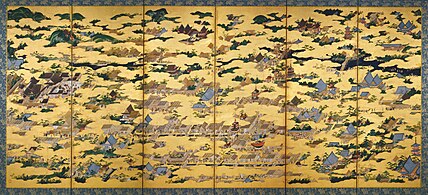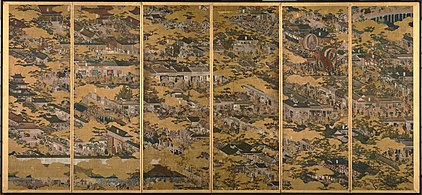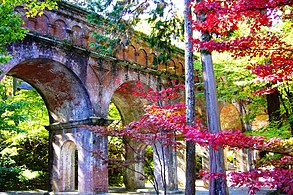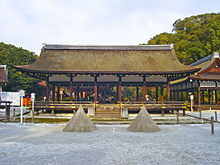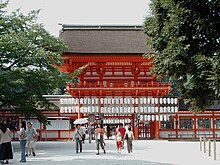Kyoto
| Year dem found am | 1 April 1889, 18 November 794 |
|---|---|
| Pseudonym | 京都 |
| Official name | 京都市 |
| Native label | 京都市 |
| Nickname | 千年の都, 文化首都 |
| Name in kana | きょうとし |
| Dem name after | capital city |
| Anthem | municipal anthem of Kyoto |
| Continent | Asia |
| Country | Japan |
| Capital of | Kyoto Prefecture |
| Capital | Nakagyō-ku |
| Edey de administrative territorial entity insyd | Kyoto Prefecture |
| Located in time zone | UTC+09:00 |
| Associated electoral district | Kyoto 1st District, Kyoto 2nd district, Kyoto 3rd district, Kyoto 4th district |
| Located in or next to body of water | Kamo River, Katsura River, Yodo River, Lake Biwa Canal |
| Located in/on physical feature | Kyoto Basin |
| Coordinate location | 35°0′42″N 135°46′5″E |
| Highest point | Mount Minako |
| Office head of government hold | mayor of Kyoto |
| Government ein head | Daisaku Kadokawa |
| Executive body | Government of Kyoto City |
| Legislative body | Kyoto City Assembly |
| Member of | Union of Kansai Governments, ICLEI – Local Governments for Sustainability, League of Historical Cities, Organization of World Heritage Cities |
| Twinned administrative body | Kyiv |
| Language dem use | Kyoto dialect |
| Significant event | Siege of Sanjō Palace |
| Day in year for periodic occurrence | October 15 |
| Postal code | 600-0000–616-9999, 520-0461–520-0465 |
| Dema official website | https://www.city.kyoto.lg.jp/ |
| Hashtag | 京都市 |
| Flag | flag of Kyoto |
| History of topic | history of Kyoto, timeline of Kyoto |
| Economy of topic | economy of Kyoto |
| Local dialing code | 75 |
| Has list | Q28683154 |
| Category for the view of the item | Category:Views of Kyoto |
| Category for maps or plans | Category:Maps of Kyoto |

Kyoto (/ˈkjoʊtoʊ/;[1] Japanese: 京都, Kyōto [kʲoꜜːto] ⓘ) officially Kyoto City (京都市, Kyōto-shi, [kʲoːtoꜜɕi] ⓘ), be de capital city of Kyoto Prefecture insyd de Kansai region of Japan ein largest den most populous island of Honshu. As of 2020[update], na de city get population of 1.46 million, wey dey make am de ninth-most populous city insyd Japan. More dan half (56.8%) of Kyoto Prefecture ein population dey reside insyd de city. De city be de cultural anchor of de substantially larger Greater Kyoto, metropolitan statistical area (MSA) home to a census-estimated 3.8 million people. E sanso be part of de even larger Keihanshin metropolitan area, along plus Osaka den Kobe.
- Gallery
-
Rakuchū rakugai zu, a 16th-century depiction of central Kyoto wey dey include Gion Matsuri floats (center) den Kiyomizu-dera (upper right)
Early modern period
[edit | edit source]- Gallery
-
Scenes insyd den around Kyoto (c. 1615)
-
Map of Heian-kyō, 1696
-
Fushimi Castle
Modern period
[edit | edit source]- Gallery
-
View of Kyoto from besyd de Hondō of Kiyomizudera – 1870s[2]
-
Nanzenji aqueduct
Contemporary history
[edit | edit source]
Geography
[edit | edit source]Terrain
[edit | edit source]Climate
[edit | edit source]| Climate data for Kyoto (1991−2020 normals, extremes 1880−present) | |||||||||||||
|---|---|---|---|---|---|---|---|---|---|---|---|---|---|
| Month | Jan | Feb | Mar | Apr | May | Jun | Jul | Aug | Sep | Oct | Nov | Dec | Year |
| Record high °C (°F) | 19.9 (67.8) |
22.9 (73.2) |
25.7 (78.3) |
30.7 (87.3) |
34.9 (94.8) |
36.8 (98.2) |
39.8 (103.6) |
39.8 (103.6) |
38.1 (100.6) |
33.6 (92.5) |
26.9 (80.4) |
22.8 (73.0) |
39.8 (103.6) |
| Mean daily maximum °C (°F) | 9.1 (48.4) |
10.0 (50.0) |
14.1 (57.4) |
20.1 (68.2) |
25.1 (77.2) |
28.1 (82.6) |
32.0 (89.6) |
33.7 (92.7) |
29.2 (84.6) |
23.4 (74.1) |
17.3 (63.1) |
11.6 (52.9) |
21.1 (70.0) |
| Daily mean °C (°F) | 4.8 (40.6) |
5.4 (41.7) |
8.8 (47.8) |
14.4 (57.9) |
19.5 (67.1) |
23.3 (73.9) |
27.3 (81.1) |
28.5 (83.3) |
24.4 (75.9) |
18.4 (65.1) |
12.5 (54.5) |
7.2 (45.0) |
16.2 (61.2) |
| Mean daily minimum °C (°F) | 1.5 (34.7) |
1.6 (34.9) |
4.3 (39.7) |
9.2 (48.6) |
14.5 (58.1) |
19.2 (66.6) |
23.6 (74.5) |
24.7 (76.5) |
20.7 (69.3) |
14.4 (57.9) |
8.4 (47.1) |
3.5 (38.3) |
12.1 (53.8) |
| Record low °C (°F) | −11.9 (10.6) |
−11.6 (11.1) |
−8.2 (17.2) |
−4.4 (24.1) |
−0.3 (31.5) |
4.9 (40.8) |
10.6 (51.1) |
11.8 (53.2) |
7.8 (46.0) |
0.2 (32.4) |
−4.4 (24.1) |
−9.4 (15.1) |
−11.9 (10.6) |
| Average precipitation mm (inches) | 53.3 (2.10) |
65.1 (2.56) |
106.2 (4.18) |
117.0 (4.61) |
151.4 (5.96) |
199.7 (7.86) |
223.6 (8.80) |
153.8 (6.06) |
178.5 (7.03) |
143.2 (5.64) |
73.9 (2.91) |
57.3 (2.26) |
1,522.9 (59.96) |
| Average snowfall cm (inches) | 5 (2.0) |
7 (2.8) |
1 (0.4) |
0 (0) |
0 (0) |
0 (0) |
0 (0) |
0 (0) |
0 (0) |
0 (0) |
0 (0) |
2 (0.8) |
15 (5.9) |
| Average precipitation days (≥ 0.5 mm) | 8.1 | 8.9 | 11.2 | 10.6 | 10.8 | 13.2 | 12.6 | 9.3 | 11.1 | 9.4 | 7.4 | 8.2 | 120.8 |
| Average relative humidity (%) | 67 | 65 | 61 | 59 | 60 | 66 | 69 | 66 | 67 | 68 | 68 | 68 | 65 |
| Mean monthly sunshine hours | 123.5 | 122.2 | 155.4 | 177.3 | 182.4 | 133.1 | 142.7 | 182.7 | 142.7 | 156.0 | 140.7 | 134.4 | 1,793.1 |
| Source: Japan Meteorological Agency[3] | |||||||||||||
Administrative divisions
[edit | edit source]| Wards of Kyoto | ||||||
|---|---|---|---|---|---|---|
| Place name | Map of Kyoto | |||||
| Rōmaji | Kanji | Population[4] | Land area in km2 | Pop. density per km2 | ||
| 1 | Kita-ku | 北区 | 117,165 | 94.88 | 1,230 |  |
| 2 | Kamigyō-ku | 上京区 | 83,832 | 7.03 | 11,900 | |
| 3 | Nakagyō-ku (administrative center) | 中京区 | 110,488 | 7.41 | 14,900 | |
| 4 | Shimogyō-ku | 下京区 | 82,784 | 6.78 | 12,200 | |
| 5 | Minami-ku | 南区 | 101,970 | 15.81 | 6,450 | |
| 6 | Nishikyō-ku | 西京区 | 149,837 | 59.24 | 2,530 | |
| 7 | Ukyō-ku | 右京区 | 202,047 | 292.07 | 690 | |
| 8 | Sakyō-ku | 左京区 | 166,039 | 246.77 | 670 | |
| 9 | Higashiyama-ku | 東山区 | 36,602 | 7.48 | 4,890 | |
| 10 | Yamashina-ku | 山科区 | 135,101 | 28.70 | 4,710 | |
| 11 | Fushimi-ku | 伏見区 | 277,858 | 61.66 | 4,510 | |
Cityscape
[edit | edit source]Kyoto dey contain roughly 2,000 temples den shrines.[5] De main business district dey locate to de south of de Kyoto Imperial Palace. Insyd de center of de city, der be several covered shopping arcades dem gbele to pedestrian traffic per, such as Teramachi Street den Shinkyōgoku Street.
- Gallery
-
View of Kyoto CBD from Shōren-in (2020)
-
Kyoto night skyline from Higashiyama (2021)
-
Kyoto Station (2018)
-
Gion (2015)
-
Ponto-chō (2010)
-
Okazaki park(2009)
Demographics
[edit | edit source]| Year | Pop. | ±% |
|---|---|---|
| 1873 | 238,663 | — |
| 1889 | 279,165 | +17.0% |
| 1900 | 371,600 | +33.1% |
| 1910 | 470,033 | +26.5% |
| 1920 | 736,462 | +56.7% |
| 1925 | 860,878 | +16.9% |
| 1930 | 987,777 | +14.7% |
| 1935 | 1,117,439 | +13.1% |
| 1940 | 1,127,870 | +0.9% |
| 1945 | 1,041,700 | −7.6% |
| 1950 | 1,130,185 | +8.5% |
| 1955 | 1,229,808 | +8.8% |
| 1960 | 1,295,012 | +5.3% |
| 1965 | 1,374,159 | +6.1% |
| 1970 | 1,427,376 | +3.9% |
| 1975 | 1,468,833 | +2.9% |
| 1980 | 1,473,065 | +0.3% |
| 1985 | 1,486,402 | +0.9% |
| 1990 | 1,461,103 | −1.7% |
| 1995 | 1,470,902 | +0.7% |
| 2000 | 1,467,785 | −0.2% |
| 2005 | 1,474,811 | +0.5% |
| 2010 | 1,474,015 | −0.1% |
| 2015 | 1,475,183 | +0.1% |
| 2020 | 1,463,723 | −0.8% |
Source: Cite error: Invalid parameter in <ref> tag | ||
Government
[edit | edit source]De city of Kyoto be governed by de mayor of Kyoto den de Kyoto City Assembly, a municipal council.
Kyoto City Assembly
[edit | edit source]
De legislative city assembly get 67 elected members, wey terms be four years for length insyd. As of 2024, de assembly be controlled by a coalition of members dem affiliate plus de Liberal Democratic Party, Komeito, den de Democratic Civic Forum.
| Parliamentary group name | Number of seats (as of January 18, 2024)[6] |
|---|---|
| Liberal Democratic Party | 18 |
| Japan Innovation Party/Kyoto Party/DPP | 18 |
| Japanese Communist Party | 14 |
| Komeito | 11 |
| Democratic Civic Forum | 2 |
| Independent | 4 |
List of mayors
[edit | edit source]| # | Name[7] | Entered office[7] | Left office[7] |
|---|---|---|---|
| 1 | Masao Kambe (神戸正雄) | April 7, 1947 | January 6, 1950 |
| 2 | Gizō Takayama (高山義三) | February 10, 1950 | February 4, 1966 |
| 3 | Seiichi Inoue (井上清一) | February 5, 1966 | January 8, 1967 |
| 4 | Kiyoshi Tomii (富井清) | February 28, 1967 | February 25, 1971 |
| 5 | Motoki Funahashi (舩橋求己) | February 26, 1971 | July 26, 1981 |
| 6 | Masahiko Imagawa (今川正彦) | September 1, 1981 | August 29, 1989 |
| 7 | Tomoyuki Tanabe (田邊朋之) | August 30, 1989 | January 29, 1996 |
| 8 | Yorikane Masumoto (桝本頼兼) | February 26, 1996 | February 24, 2008 |
| 9 | Daisaku Kadokawa (門川大作) | February 25, 2008 | February 24, 2024 |
| 10 | Koji Matsui (松井孝治) | February 25, 2024 | present |
Economy
[edit | edit source]| Year | US$ |
|---|---|
| 1975 | 5,324 |
| 1980 | 9,523 |
| 1985 | 13,870 |
| 1990 | 20,413 |
| 1995 | 23,627 |
| 2000 | 26,978 |
| 2005 | 32,189 |
| 2010 | 36,306 |
| 2015 | 41,410 |


Information technology den electronics be key industries insyd Kyoto. De city be home to de headquarters of Nintendo, Intelligent Systems, SCREEN Holdings,[10] Tose, Hatena, Omron,[11] Kyocera, Shimadzu,[12] Rohm,[13] Horiba,[14] Nidec Corporation,[15] Nichicon,[16] Nissin Electric,[17] den GS Yuasa.
Oda notable businesses headquartered insyd Kyoto include Aiful, Ishida, Nissen Holdings, Gyoza no Ohsho, Sagawa Express, Volks, den Wacoal.
Education
[edit | edit source]Primary den secondary education
[edit | edit source]As of 1 May 2023, na der be 154 municipal public elementary schools insyd Kyoto, plus total of 55,736 pupils. At de secondary level, na der be 66 municipal public junior high schools plus 27,046 students den 11 municipal public senior high schools plus 5,117 students.[18]
Tertiary education
[edit | edit source]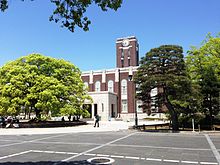
Home to 40 institutions of higher education, Kyoto be one of de academic centers insyd Japan.[19] Dem dey rank Kyoto University highly among all universities nationwide, plus eight Nobel laureates den two Prime Ministers of Japan among ein alumni.[20][21] De Research Institute for Mathematical Sciences den de Yukawa Institute for Theoretical Physics, both be part of de university, na dem affiliate plus influential mathematicians den physicists. Private universities such as Doshisha University den Ritsumeikan University sanso dey locate insyd de city.
De Consortium of Universities insyd Kyoto be Kyoto-based higher education network wey dey consist of three national universities, three public (prefectural den municipal) universities, 45 private universities, five oda organizations, den representatives from de city government. De Consortium no dey offer degrees, buh e dey allow students of member universities make dem take courses at oda member universities.[22]
Transportation
[edit | edit source]Railways
[edit | edit source]
High-speed rail
[edit | edit source]Conventional lines
[edit | edit source]
- Hankyu Railway
-
- Hankyu Arashiyama Line
- Hankyu Kyoto Main Line
- Keihan Electric Railway
-
- Keihan Main Line
- Keihan Ōtō Line
- Keihan Keishin Line
- Keihan Uji Line
- Keihan Main Line
- Kintetsu Railway
-
- Kintetsu Kyoto Line
- Sagano Scenic Railway
-
- Sagano Scenic Line
- West Japan Railway Company (JR West)
-
- Kosei Line
- Nara Line
- San'in Main Line (Sagano Line)
- Tōkaidō Main Line (JR Kyoto Line/Biwako Line)
Subways
[edit | edit source]
De Kyoto Municipal Transportation Bureau dey operate de Kyoto Municipal Subway wey dey consist of two lines: de Karasuma Line den de Tōzai Line. Dem link de two lines for Karasuma Oike Station near Kyoto ein central business district.
Tramways
[edit | edit source]- Eizan Electric Railway (Eiden)
-
- Eizan Kurama Line
- Eizan Main Line
- Keifuku Electric Railroad (Randen)
-
- Keifuku Arashiyama Main Line
- Keifuku Kitano Line
Buses
[edit | edit source]
Roads den waterways
[edit | edit source]
Kyoto get fewer toll-highways dan oda Japanese cities of comparable size. Der be nine national highways insyd de city of Kyoto: Route 1, Route 8, Route 9, Route 24, Route 162, Route 171, Route 367, Route 477, den Route 478.
Culture
[edit | edit source]

Sites insyd Kyoto dey include Arashiyama, de Gion den Ponto-chō geisha quarters, de Philosopher's Walk, den de canals dat line sam of de older streets.
De "Historic Monuments of Ancient Kyoto" be listed by de UNESCO as a World Heritage Site. Dese dey include de Kamo Shrines (Kami den Shimo), Kyō-ō-Gokokuji (Tō-ji), Kiyomizu-dera, Daigo-ji, Ninna-ji, Saihō-ji (Kokedera), Tenryū-ji, Rokuon-ji (Kinkaku-ji), Jishō-ji (Ginkaku-ji), Ryōan-ji, Hongan-ji, Kōzan-ji, den de Nijō Castle, dem primarily build by de Tokugawa shōguns. Oda sites outsyd de city sanso dey for de list top.
Festivals
[edit | edit source]- Aoi Matsuri for May 15.
- Gion Matsuri for July 17
- Bon Festival plus de Gozan no Okuribi, dey light fires for mountains top make dem guide de spirits home (August 16).
- Jidai Matsuri, Festival of de Ages, dey celebrate Kyoto ein illustrious past for October 22
-
Gion Matsuri
-
Gozan no Okuribi
-
Aoi Matsuri
-
Jidai Matsuri
UNESCO World Heritage Site
[edit | edit source]De UNESCO World Heritage Site Historic Monuments of Ancient Kyoto (Kyoto, Uji den Otsu Cities) dey include fourteen temples, shrines, den castles insyd Kyoto wey dey date from between de sixth century (Shimogamo Shrine, though extant structures be more recent) den de seventeenth century (Nijō Castle). Na dem designate de sites as World Heritage insyd 1994.
-
Kamigamo Shrine
-
Shimogamo Shrine
-
Kōzan-ji
Museums
[edit | edit source]

- Hakusasonso Hashimoto Kansetsu Garden den Museum (白沙村荘 橋本関雪記念館)
- Hosomi Museum (細見美術館)
- Joutenkaku Museum (承天閣美術館)
- Kitamura Museum (北村美術館)
- Koryo Museum of Art (高麗美術館)
- Kyoto Arashiyama Orgel Museum (京都嵐山オルゴール美術館)
- Kyoto Art Center (京都芸術センター)
- Kyoto Botanical Garden (京都府立植物園)
- Kyoto City Archaeological Museum (京都市考古資料館)
- Kyoto City Heiankyo Sosei-Kan Museum (京都市平安京創生館)
- Kyoto International Manga Museum (京都国際マンガミュージアム)
- Kyoto Kaleidoscope Museum (京都万華鏡ミュージアム)
- Kyoto Municipal Museum of Art (京都市美術館)
- Kyoto Museum for World Peace (国際平和ミュージアム)
- Kyoto Museum of Traditional Crafts (京都伝統産業ふれあい館)
- Kyoto National Museum (京都国立博物館)
- Kyoto Prefectural Garden of Fine Arts (京都府立陶板名画の庭)
- Kyoto Prefectural Insho-Domoto Museum of Fine Arts (京都府立堂本印象美術館)
- Kyoto Railway Museum (京都鉄道博物館)
- Kyoto University Museum (京都大学総合博物館)
- Museum of Kyoto (京都府京都文化博物館)
- Namikawa Cloisonne Museum of Kyoto (並河靖之七宝記念館)
- National Museum of Modern Art, Kyoto (京都国立近代美術館)
- Nomura Art Museum (野村美術館)
- Onishi Seiwemon Museum (大西清右衛門美術館)
- Raku ware Museum (楽美術館)
- Ryozen Museum of History (幕末維新ミュージアム 霊山歴史館)
- Sen-oku Hakuko Kan (泉屋博古館)
- Shigureden (時雨殿)
- Tin Toy Museum (ブリキのおもちゃ博物館)
- Toei Kyoto Studio Park (東映太秦映画村)
- Yurinkan Museum (藤井斉成会有鄰館)
Sports
[edit | edit source]
| Club | Sport | League | Venue | Established |
|---|---|---|---|---|
| Kyoto Sanga FC | Soccer | J.League | Sanga Stadium by Kyocera Takebishi Stadium Kyoto |
1922 |
| SGH Galaxy Stars | Softball | JD. League | Wakasa Stadium Kyoto | 1986 |
| Kyoto Hannaryz | Basketball | B.League | Hannaryz Arena | 2009 |
| Kyoto Kaguyalyze | Table tennis | T.League | Shimadzu Arena Kyoto | 2022 |
International relations
[edit | edit source]Sisto cities
[edit | edit source]De city of Kyoto get sister-city relationships plus de cities wey dey follow:[23]
 Boston, United States (since June 1959)
Boston, United States (since June 1959) Cologne, Germany (since May 1963)
Cologne, Germany (since May 1963) Florence, Italy (since September 1965)
Florence, Italy (since September 1965) Guadalajara, Mexico (since October 1980)[24]
Guadalajara, Mexico (since October 1980)[24] Kyiv, Ukraine (since September 1971)
Kyiv, Ukraine (since September 1971) Prague, Czech Republic (since April 1996)[25]
Prague, Czech Republic (since April 1996)[25] Xi'an, China (since May 1974, friendship city)
Xi'an, China (since May 1974, friendship city) Zagreb, Croatia (since October 1981)
Zagreb, Croatia (since October 1981)
Partner cities
[edit | edit source] Brussels, Belgium (since April 2006)
Brussels, Belgium (since April 2006) Huế, Vietnam (since February 2013)
Huế, Vietnam (since February 2013) Istanbul, Turkey (since June 2013)
Istanbul, Turkey (since June 2013) Jinju, South Korea (since March 1999)
Jinju, South Korea (since March 1999) Konya, Turkey (since December 2009)
Konya, Turkey (since December 2009) Paris, France (since June 1958)[26]
Paris, France (since June 1958)[26] Qingdao, China (since August 2012)
Qingdao, China (since August 2012) Quebec City, Canada (since May 2016)
Quebec City, Canada (since May 2016) Tainan, Taiwan (since June 2021)
Tainan, Taiwan (since June 2021) Varanasi, India (since August 2014)[27]
Varanasi, India (since August 2014)[27] Vientiane, Laos (since November 2015)
Vientiane, Laos (since November 2015) Yilan City, Taiwan (since August 2018)
Yilan City, Taiwan (since August 2018)
References
[edit | edit source]Citations
[edit | edit source]- ↑ "Kyoto | Definition of Kyoto by Merriam-Webster". Merriam-Webster. Archived from the original on August 3, 2020. Retrieved May 7, 2020.
- ↑ Lyman, Benjamin Smith (2020-08-03). "FSA A1999.35 092: Kyoto: View from Kiyomizudera". Smithsonian (in American English). Archived from the original on 2021-06-26. Retrieved 2022-07-16.
- ↑ 気象庁 / 平年値 (年・月ごとの値). Japan Meteorological Agency. Archived from the original on May 21, 2021. Retrieved May 19, 2021.
- ↑ 令和2(2020)年国勢調査. City of Kyoto. Archived from the original on September 5, 2022. Retrieved September 5, 2022.
- ↑ Scott, David (1996). Exploring Japan. Fodor's Travel Publications, Inc. ISBN 0-679-03011-5
- ↑ 議員名簿・京都市会. Kyoto City Assembly. Archived from the original on August 21, 2022. Retrieved February 25, 2024.
- ↑ 7.0 7.1 7.2 歴代市長、副市長・助役一覧. Kyoto City. Archived from the original on May 19, 2022. Retrieved February 25, 2024.
- ↑ 県民経済計算 (in Japanese). Cabinet Office (Japan). Archived from the original on October 17, 2017. Retrieved October 16, 2017.
- ↑ "Purchasing power parities (PPP)". OECD. Archived from the original on November 4, 2017. Retrieved October 16, 2017.
- ↑ "Dainippon Screen corporate profile". Archived from the original on September 28, 2023. Retrieved March 6, 2014.
- ↑ "OMRON corporate data". Archived from the original on December 22, 2015. Retrieved September 13, 2014.
- ↑ "Shimadzu corporate profile". Archived from the original on March 13, 2015. Retrieved April 16, 2014.
- ↑ "Rohm corporate data". Archived from the original on September 28, 2023. Retrieved September 13, 2014.
- ↑ "Horiba company outline". Archived from the original on September 13, 2014. Retrieved September 13, 2014.
- ↑ "Nidec company profile". Archived from the original on March 3, 2014. Retrieved February 3, 2014.
- ↑ "Nichicon company profile". Archived from the original on July 18, 2018. Retrieved June 12, 2015.
- ↑ "Nissin Electric company outline". Archived from the original on December 30, 2017. Retrieved January 30, 2015.
- ↑ "Educational statistics". City of Kyoto (in Japanese). Retrieved 2024-06-22.
- ↑ "Kyoto Uses Its Many Charms to Attract Foreign Students". The New York Times. June 29, 2014. Archived from the original on October 5, 2017. Retrieved March 2, 2017.
- ↑ "Kyoto University". Top Universities (in English). Retrieved 2024-06-22.
- ↑ "Kyoto University". Times Higher Education (THE) (in English). 2024-04-05. Retrieved 2024-06-22.
- ↑ "English". Consortium of Universities in Kyoto. Archived from the original on July 20, 2014. Retrieved July 15, 2014.
- ↑ "Sister Cities of Kyoto City". City of Kyoto. Archived from the original on March 15, 2019. Retrieved December 6, 2015.
- ↑ "Sister Cities, Public Relations". Guadalajara municipal government. Archived from the original on March 2, 2012. Retrieved March 12, 2013.
- ↑ "Partnerská města HMP" [Prague - Twin Cities HMP]. Portál "Zahraniční vztahy" [Portal "Foreign Affairs"] (in Czech). July 18, 2013. Archived from the original on June 25, 2013. Retrieved August 5, 2013.
- ↑ "Paris et Kyoto célèbrent leurs soixante ans d'amitié". Archived from the original on February 22, 2020. Retrieved February 22, 2020.
- ↑ "MoUs with Japan". Archived from the original on January 23, 2022. Retrieved March 3, 2019.
Bibliography
[edit | edit source]- Fiévé, Nicolas (ed.) (2008) Atlas historique de Kyôto. Analyse spatiale des systèmes de mémoire d'une ville, de son architecture et de ses paysages urbains. Foreword Kôichirô Matsuura, Preface Jacques Gernet, Paris, Éditions de l'UNESCO / Éditions de l'Amateur, 528 pages, 207 maps et 210 ill. ISBN 978-2-85917-486-6.
- Fiévé, Nicolas and Waley, Paul. (2003). Japanese Capitals in Historical Perspective: Place, Power and Memory in Kyoto, Edo and Tokyo. London: Routledge. 417 pages + 75 ill. ISBN 978-0-7007-1409-4
- Lone, John. (2000). Old Kyoto: A Short Social History. Oxford: Oxford University Press. ISBN 0-19-590940-2
- Ponsonby-Fane, Richard A. B. (1956). Kyoto: The Old Capital of Japan, 794–1869. Kyoto: The Ponsonby Memorial Society.
- Ropke, Ian Martin. Historical Dictionary of Osaka and Kyoto. 273pp Scarecrow Press (July 22, 1999). ISBN 978-0810836228.
External links
[edit | edit source]- Kyoto City Official Website (in Japanese)
- Kyoto City Official Travel Guide, City of Kyoto and Kyoto City Tourism Association
 Geographic data related to Kyoto at OpenStreetMap
Geographic data related to Kyoto at OpenStreetMap
- Pages with script errors
- Pages with reference errors
- Pages with reference errors that trigger visual diffs
- Pages using the JsonConfig extension
- CS1 American English-language sources (en-us)
- CS1 uses Japanese-language script (ja)
- CS1 Japanese-language sources (ja)
- CS1 English-language sources (en)
- CS1 Czech-language sources (cs)
- Pages using ISBN magic links
- Articles using generic infobox
- Articles containing potentially dated statements from 2020
- All articles containing potentially dated statements
- Articles containing Japanese-language text
- Kyoto
- Former capitals of Japan
- Environmental model cities
- Ancient cities
- Kansai region
- Pages using Sister project links with wikidata namespace mismatch
- Pages using Sister project links with wikidata mismatch
- Pages using Sister project links with default search
- Populated places dem establish insyd de 8th century
- 1889 establishments insyd Japan
- Holy cities
- Pages using the Kartographer extension


